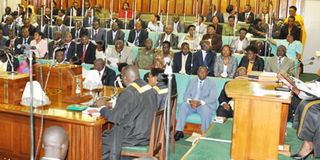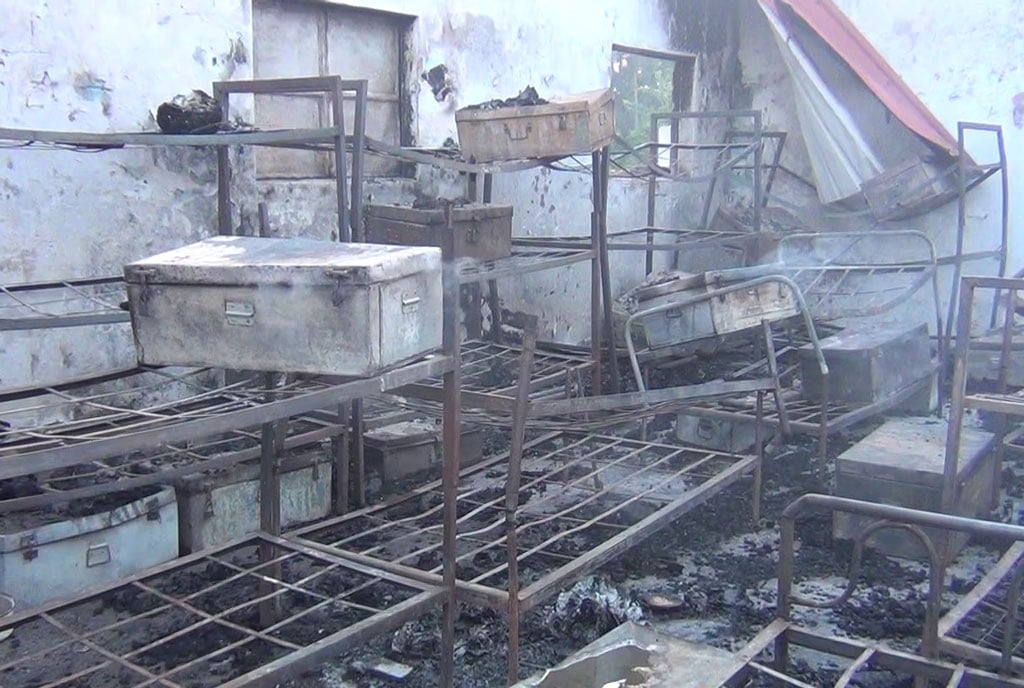Of MPs’ budget cuts and politics of ‘Animal Farm’

Lawmakers have hit a deadlock over proposals that the health budget gets more funds. PHOTO BY GEOFFREY SSERUYANGE
Wake up call. The budget is of course about figures but it is foremost about people and their needs. MPs are the citizens’ representatives and ought to know what their needs are.
When you critically analyse the budget drama in Parliament, you realise that “all ministries are equal, but some are more equal than others”. For the record, this article has nothing to do with the proclamation by the “animals” controlling the public affairs in George Orwell’s iconic novel, “Animal Farm”.
In Orwell’s satire of the failed Russian Revolution, after the death of Old Major, the new breed of leaders are overwhelmed with power, and begin to abuse it. The animals set seven commandments that will govern them but by the end of the novel, the commandments shrink to one: “All animals are equal, but some animals are more equal than others”.
This is a clear display of how power had influenced the founding laws, and the corrosion of morals. But in the factual world, this political satire is a valiant statement on the insincerity of governments that proclaim the absolute equality of their citizens but give power and privileges to a small elite.
Back in the House, the budget crisis is deepening every day as the struggle to save the sick health sector now takes a dramatic turn. At the pinnacle of the budget spectacle, we read in the press this week that the NRM leader stormed out of the caucus meeting on Monday after he was heckled by some NRM legislators who accused him of being indifferent to the health of Ugandans. As this drama played out, Mr Museveni found himself in trouble for swearing never to “sacrifice the defence budget” for anything.
The opposition to his vision did not stop him from trying again. He spent the whole of last week ‘struggling’ to break the deadlock over the health budget. So far, there is no indication of a mutual deal, even though one of his procrastinating ministers Matia Kasaija promised to consult his bosses on the possibility of tabling corrigenda to take care of the challenges in the health sector. The government has warned that any attempts by Parliament to cut money from some votes would disorganise the budget priorities.
With this comedy in mind, last week, I argued in this column that even with a small resource envelope (Shs11.4 trillion) we could undeniably fix the health sector. What this means is that if we had an informed Parliament with a scrupulous Budget Committee and a concerned Executive on the other hand, we could have saved the healthcare system.
In budgeting, some sectors are more equal than others.
But whenever there is a crisis, it’s only logical that meaningful budget cuts are done to raise the required funds. When a request for Shs260 billion to recruit and motivate health workers was tabled, the Budget Committee dashed to make selective cuts and closed eyes on others. Even so, with a 30 per cent cut, they only managed to get Shs39.2 billion.
However, the practical solution to the crisis in the health sector and other discounted deficits in government agencies would require a comprehensive review of the budget to isolate “gluttonous” agencies. Normally, when countries get into trouble, for example cash crisis, they may be backed into a corner and feel forced to do things they wouldn’t normally do in terms of survival. This is why all sectors should have shared the pain.
I admire the vigor with which MPs are pushing for increased budget for the health sector. Indeed, the Shs260b should be provided to health without fail. But politics is about seizing the moment. If Parliament loosens the country’s fiscal policy, it will never tighten it again and if the haste in the handling of this year’s budget continues, Ugandans will know who to blame.
Whichever way you look at these things, the proposed budget cuts (Shs39.2b) were inadequate and bound to generate a dysfunctional order in the House, which has now climaxed in a deadlock.
Blind eye
Parliament had the opportunity to study the government priorities and adjust them accordingly. Unfortunately, legislators followed the “script” but with a bit of politics in the mix and glaring loopholes— baring the hallmarks of a jumbled process, typical of the politics of “Animal Farm”. Nobody bothered to ask why this year’s budget falls short of the government aspirations in the National Development Plan.
Some votes were cut by 30 per cent and others with special meals, entertainment, fat-cat allowances, travel, stationery, etc. were left intact. For example, it’s ridiculous that the Budget Committee did not cut the Shs6.1 billion State House wants to donate when the health sector is in shambles. In fact, the Committee did not cut anything from State House’s Shs127.8billion budget not even from the Shs90b put under the Office of the President. In any case, the House Budget Office should have advised the Budget Committee to study the spending behaviour of these so-called “gluttonous” agencies— the “bottomless pits”.
More scrutiny of the budget has revealed that the government wants to spend more than Shs15 billion to treat its officials abroad when patients in referral hospitals are sharing beds. The plight of a ‘sick” healthcare system has now become a sad song, but the singing needs to stop and our MPs need to get serious before it’s too late. The Budget Act 2001 is clear on the role of Parliament in the budgeting process. It is the right body to ensure that the budget meets the public needs.
The Budget is the most important economic policy tool of any serious government and it provides a comprehensive statement of its priorities. Debate returns on Tuesday.
==================================
Flowers: nrm parliamentarians
This week we give flowers to NRM MPs who stood their ground in defence of the health budget. We are not giving these MPs flowers because they heckled the President on Monday, but because they care about the health of Ugandans. As the representative of the people, Parliament is the appropriate place to ensure that the budget reflects the priorities of the nation. Bravo NRM MPs and your caucus vice chairperson David Bahati.
Frowns: Public service and finance
The ministries of Finance and Public Service officials take the frowns for allegedly keeping ghosts on the pensioners’ payroll. This week, a police investigation found a racket of senior staff in these ministries who paid out at least Sh63 billion to 1,000 ghost pensioners last year. Recently, the Auditor General also found ghosts on the government payroll squandering more than Shs70billion. This is too much and our view is that the government must act before it’s too late.




